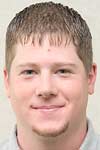Senate seeks to improve campus parking

Eric Norris – Student Senate President
Student senators took up an initiative to improve the campus with the spring semester. One of the issues on their agenda was accessible parking.
On March 29, the Student Senate voted to approve a report on the accessible parking spaces on campus and other various accessibility issues.
“It’s pretty obvious it’s an issue on campus that needs to be addressed,” said Eric Norris, Senate president. “We put a committee together and I supported it.”
The committee is made up of three senators: Greg Salzer, Senate vice-president; David Slatton, junior senator; and Melody Salzer, freshman senator.
“It’s a wonderful thing,” Slatton said. “We need more disabled parking spaces and to be able to keep school employees without disabilities from parking in the disabled parking spots.”
Norris said he had talked with Bob Harrington, director of the Physical Plant, about the issue before the semester, but did not have all the facts available.
“Unfortunately, it took us this long to do this,” Norris said.
Harrington said the idea is sound, but he would have liked to have talked with the committee before the report was created.
“The way it reads, it sounds like they assume we are not doing our job,” he said. “However, I think that we are.”
At the time of publication, Harrington had received the report from the Senate and sent his reply to the senators.
“We are very anxious to set up a meeting,” he said. “We’re very well aware of some of the issues.”
Harrington said some of the issues the report included were due to funding issues, space limitations and special cases.
One parking Lot, lot 14, has one spot, which does not meet the Americans with Disabilities Act standards. This space was brought up in the report, but Harrington said the space was created for a student on a special request.
“The parking spot was designated because one student was disabled, but could still walk to class,” Harrington said. “He just needed to have a parking spot closer to the buildings.”
Slatton said the ratio of accessible parking spaces to regular parking spaces are too low for the campus.
The report totaled each lot separately based on the ADA recommended formula for calculating accessible parking areas. Based on the report, the minimum number of accessible spaces on campus is 108. The number available is 67. There are 26 van accessible spaces on campus, but the report states there are 38 required.
However, Harrington said the math is a matter of perspective.
The Physical Plant took the total number of spaces, applied the same formula to it and then decided to compromise between what is possible and what is needed.
For example, some lots do not have accessible spaces because of their location in respect to the rest of campus.
“From lot 18, for example, you can park there, but there’s no way a disabled student could easily go anywhere from there,” Harrington said.
Norris said he hopes the issue can be worked out before the next time the parking lots are paved. This way, the spots can be converted without any special preparation.
Harrington said he would like to meet with the senators before the next budget year because the budget can be adjusted for the spaces.
“Hopefully, we can fix the problem and get our parking lots up to code within a reasonable amount of time,” Norris said.
Slatton said one problem with the spaces is having other students parking in the spaces, but also the distribution can be adjusted.
The place with the most concern is the space in front of the Billingsly Student Center. Here, Slatton said there are several occasions where non-disabled students will park there and not move.
“There’s only one spot there and everybody parks in the fire lane,” he said.
Harrington said the spaces in front of Billingsly and several other buildings were built the way they were because of the landscape.
“We sit on enough hills,” he said.
Norris said he is glad Harrington is willing to work with the senators.
Harrington said he is willing to help where he can and hopes they can come to a viable solution with what is available.
“We will do what we can and we are more than willing to work with them,” he said.
The report was also sent to Dr. Melissa Locher, coordinator of disability services, and Dr. Terri Agee, vice president for business affairs.
Your donation will support the student journalists of Missouri Southern State University. Your contribution will allow us to purchase equipment and cover our annual website hosting costs.















